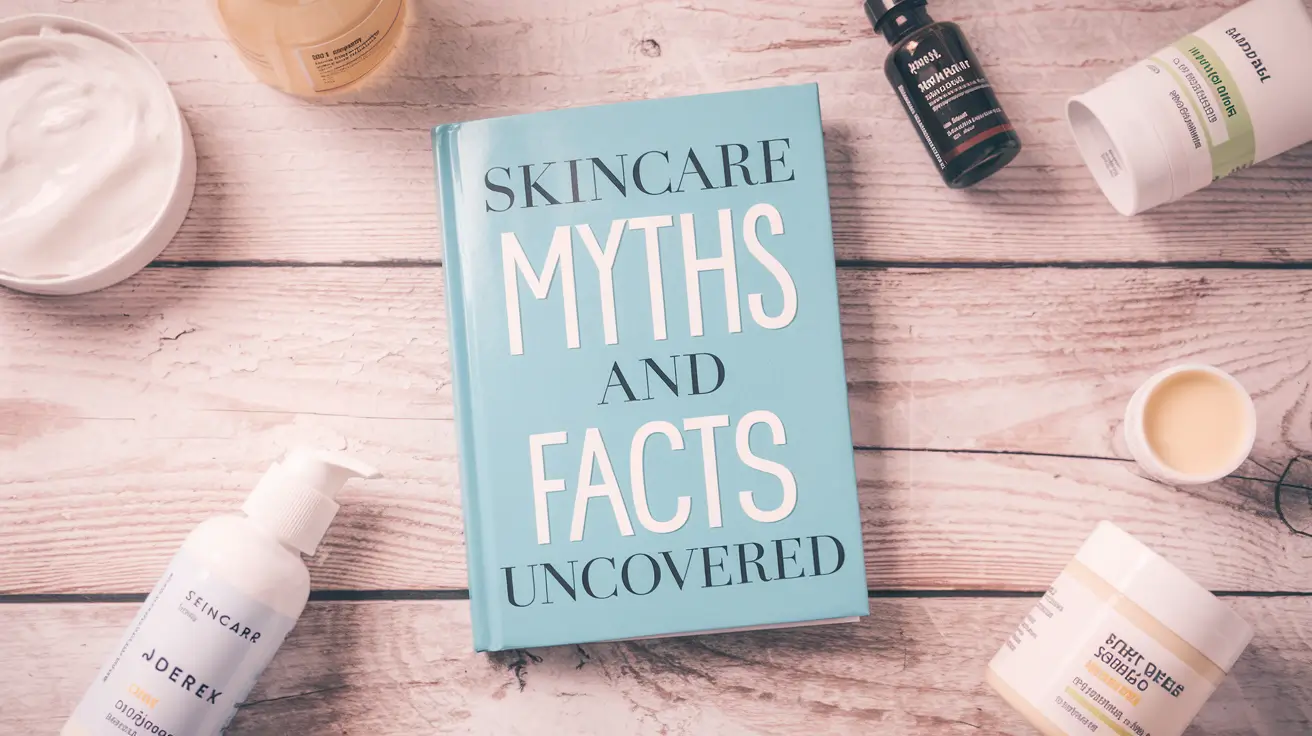Are All Natural Ingredients Safe for Skin? Understanding the Truth Behind Natural Skincare
Explore the truth about natural skincare: Are all natural ingredients safe for your skin? Find out now!

In recent years, the skincare industry has seen a surge in the popularity of natural ingredients.
Many people believe that natural means safe, but this isn't always the case. Understanding what 'natural' truly means and the potential risks associated with these ingredients is essential for anyone looking to take care of their skin.
This article will explore the truth behind natural skincare, the benefits and drawbacks of natural ingredients, and how to make informed choices for your skincare routine.
Key Takeaways
- Not all natural ingredients are safe for everyone; some can cause irritation or allergic reactions.
- Understanding product labels is crucial to avoid harmful substances in skincare, whether natural or synthetic.
- Consulting with skincare experts can help clarify misconceptions about natural products.
- A minimalist skincare routine with fewer products can often be more effective and less irritating.
- Patch testing new products is essential to ensure they are suitable for your skin.
Understanding the Term 'Natural' in Skincare

What Does 'Natural' Really Mean?
When we hear the word natural, we often think it means safe and good for our skin.
But here’s the kicker: not all natural ingredients are created equal.
The term can mean different things depending on who you ask. Some products might be labeled as natural just because they have a few plant-based ingredients, while still containing harmful additives.
So, it’s super important to read the labels and know what’s really in our skincare products.
Common Misconceptions About Natural Ingredients
There are a few myths floating around about natural ingredients that we need to clear up:
- All natural ingredients are safe: This is a big one! Just because something is labeled as natural doesn’t mean it won’t irritate your skin.
- Natural products are always better: Sometimes, synthetic ingredients can be more effective or safer than their natural counterparts.
- Natural means organic: Not necessarily! Just because something is natural doesn’t mean it’s organic or free from harmful chemicals.
Regulations and Standards for Natural Products
The skincare industry is a bit of a wild west when it comes to regulations. Unlike organic products, which have strict guidelines, the term natural is often loosely defined.
Here’s a quick look at what to keep in mind:
- Lack of regulation: There’s no universal standard for what qualifies as natural, making it hard to know what we’re really getting.
- Ingredient sourcing: Ingredients sourced directly from nature, without synthesizing or stabilization in a lab environment, are more likely to go bad faster. In general, natural products can have a shorter shelf life.
- Consumer awareness: We need to be savvy shoppers! Understanding what’s in our products helps us make better choices for our skin.
Remember, just because something is labeled as natural doesn’t mean it’s the best choice for our skin. Let’s be smart and informed about what we put on our faces!
The Benefits and Drawbacks of Natural Ingredients

Advantages of Using Natural Ingredients
When we think about natural skincare, we often get excited about the good stuff that comes from nature. Natural ingredients can be super beneficial for our skin!
Here are some perks:
- Rich in antioxidants: Many natural ingredients, like green tea, help fight free radicals that can damage our skin.
- Gentle on the skin: They’re often less irritating than synthetic options, making them great for sensitive skin types.
- Eco-friendly: Using natural ingredients can be better for the environment, especially if they’re sustainably sourced.
Potential Risks and Side Effects
But hold on! Not everything that’s natural is automatically safe. We need to be aware of some potential downsides:
- Allergic reactions: Some natural ingredients, like essential oils, can cause irritation or allergies in certain people.
- Lack of regulation: The natural skincare industry isn’t as tightly regulated as we might think, which can lead to misleading claims.
- Not always effective: Some natural ingredients might not work as well for specific skin issues, like acne or aging, compared to their synthetic counterparts.
Expert Opinions on Natural Skincare
Experts often have mixed feelings about natural skincare.
Here’s what they say:
- Balance is key: Many dermatologists suggest combining natural and synthetic ingredients for the best results.
- Patch testing is a must: Before diving into a new product, it’s smart to do a patch test to see how our skin reacts.
- Educate ourselves: Understanding what’s in our products helps us make better choices for our skin.
Remember, while natural ingredients can be amazing, it’s important to know what works for our unique skin needs. Let’s keep our skincare routine safe and effective!
Comparing Natural and Synthetic Skincare Products
When we dive into the world of skincare, we often hear the terms natural and synthetic thrown around. But what do they really mean? Let’s break it down together!
Effectiveness of Natural vs. Synthetic Ingredients
Natural ingredients are derived from plants and minerals, while synthetic ingredients are created in labs.
Both have their pros and cons. For instance, natural ingredients like aloe vera and green tea are praised for their soothing properties, but they can sometimes cause allergic reactions.
On the flip side, synthetic ingredients like hyaluronic acid are known for their effectiveness in hydration and anti-aging.
Ingredient Type | Pros | Cons |
|---|---|---|
Natural | Gentle, often less irritating | Can cause allergies, less consistent results |
Synthetic | Highly effective, consistent | May contain harmful chemicals, ethical concerns |
Environmental Impact of Skincare Choices
When we think about our planet, choosing natural products can feel like a win. They often have a smaller carbon footprint and are less likely to harm wildlife. However, not all natural products are eco-friendly. For example, some natural oils can lead to deforestation. So, it’s essential to do our homework!
Cost and Accessibility
Let’s face it, price matters!
Natural products can sometimes be pricier due to sourcing and production methods. But that doesn’t mean we can’t find affordable options. Many brands are now offering budget-friendly natural products that don’t skimp on quality.
In the end, whether we choose natural or synthetic, it’s all about what works best for our skin and our values. Let’s make informed choices together!
Identifying Safe Natural Ingredients for Your Skin
Top Safe Natural Ingredients
When we dive into the world of natural skincare, it’s essential to know which ingredients are truly safe for our skin.
Here are some of our favorites:
- Aloe Vera: Great for hydration and soothing irritation.
- Coconut Oil: A fantastic moisturizer that can help with dry skin.
- Jojoba Oil: Mimics our skin's natural oils, making it perfect for all skin types.
Ingredients to Avoid
Not everything labeled as natural is good for us. Here’s a quick list of ingredients we should steer clear of:
- Synthetic Fragrances: These can cause irritation and allergic reactions.
- Parabens: Often used as preservatives, they can disrupt hormones.
- Sulfates: These harsh cleansers can strip our skin of its natural oils.
How to Patch Test New Products
Before we fully commit to a new product, patch testing is a must! Here’s how we can do it:
- Choose a small area: Pick a spot on your arm or behind your ear.
- Apply a small amount: Use a pea-sized amount of the product.
- Wait 24-48 hours: Keep an eye on the area for any reactions.
Remember, not all natural ingredients are safe. By being cautious and informed, we can keep our skin healthy and glowing!
Creating a Natural Skincare Routine

Essential Steps for a Natural Skincare Routine
Creating a natural skincare routine doesn’t have to be complicated.
We can keep it simple and effective!
Here are the essential steps we can follow:
- Cleanser: Start with a gentle, natural cleanser. Look for one that’s free from harsh chemicals and sulfates. A gentle cleanser is all you really need to start your routine off right.
- Moisturizer: Choose a moisturizer that suits your skin type. If you have dry skin, go for something rich and creamy. For oily skin, a lightweight gel works best.
- Sunscreen: Never skip sunscreen! It’s crucial for protecting our skin from harmful UV rays.
Customizing Your Routine for Different Skin Types
We all have different skin types, so let’s customize our routine:
- Oily Skin: Use oil-free products and lightweight moisturizers.
- Dry Skin: Opt for rich creams and hydrating serums.
- Sensitive Skin: Stick to fragrance-free and gentle products.
Tips for Maintaining Healthy Skin
- Stay Hydrated: Drink plenty of water to keep our skin hydrated from the inside out.
- Balanced Diet: Eating fruits and veggies can help our skin glow.
- Regular Exercise: It boosts circulation and helps our skin look fresh.
Remember, consistency is key! Sticking to our routine will help us see the best results over time.
By following these steps, we can create a personalized skincare routine that works for us. Let’s embrace our natural beauty and glow together!
Expert Tips for Navigating Natural Skincare

Reading and Understanding Labels
When we dive into the world of natural skincare, reading labels is super important! Here’s what we should keep in mind:
- Look for familiar ingredients; if you can’t pronounce it, maybe skip it!
- Ingredients are listed from most to least, so the first few are key.
- Avoid harmful substances like parabens and sulfates.
Consulting with Dermatologists
We all want the best for our skin, right? Consulting with dermatologists can help us make informed choices. Here are some questions to consider:
- What ingredients should I avoid?
- Are there any products you recommend?
- How can I address specific skin concerns safely?
Real-Life Success Stories
Hearing from others can inspire us! Many people have shared their journeys with natural skincare, often reporting:
- Fewer breakouts and irritation.
- More time in their daily routine.
- Savings on skincare products.
Remember, our skin changes over time, so it’s important to regularly review our routine to ensure it meets our current needs.
By following these tips, we can navigate the natural skincare world with confidence and keep our skin glowing!
Debunking Myths About Natural Skincare
Myth: All Natural Ingredients Are Safe
Let’s get real: not all natural ingredients are safe for our skin.
Just because something is labeled as natural doesn’t mean it won’t cause irritation or allergic reactions.
For example, essential oils can be potent and might not be suitable for everyone. So, always remember to patch test before diving in!
Myth: Natural Products Are Always Better
We often hear that natural products are the best choice, but that’s not always true.
Some natural ingredients can be less effective than their synthetic counterparts. For instance, while ingredients sourced directly from nature can be great, they can also spoil faster. This means we might not get the benefits we expect.
Myth: Synthetic Ingredients Are Harmful
Here’s the kicker: not all synthetic ingredients are bad!
Many have been thoroughly tested and are safe for our skin. In fact, some synthetic ingredients can provide benefits that natural ones can’t. It’s all about knowing what works for our skin and choosing wisely.
Remember, understanding what goes into our skincare products helps us make better choices for our skin's health.
Quick Recap of Myths
Myth | Truth |
|---|---|
All natural ingredients are safe | Some can cause irritation |
Not always effective | |
Many are safe and beneficial |
Wrapping It Up: The Real Deal on Natural Ingredients
So, here’s the scoop: not all natural ingredients are safe for your skin.
While many natural products can be gentle and effective, some can cause irritation or allergic reactions. It’s super important to read labels and know what’s in your skincare. Just because something is labeled as ‘natural’ doesn’t mean it’s automatically good for you.
Always do your homework, and don’t hesitate to consult with a dermatologist if you’re unsure. In the end, finding the right balance between natural and synthetic ingredients can help you achieve that healthy glow without any surprises.
Keep your skin happy and glowing!






